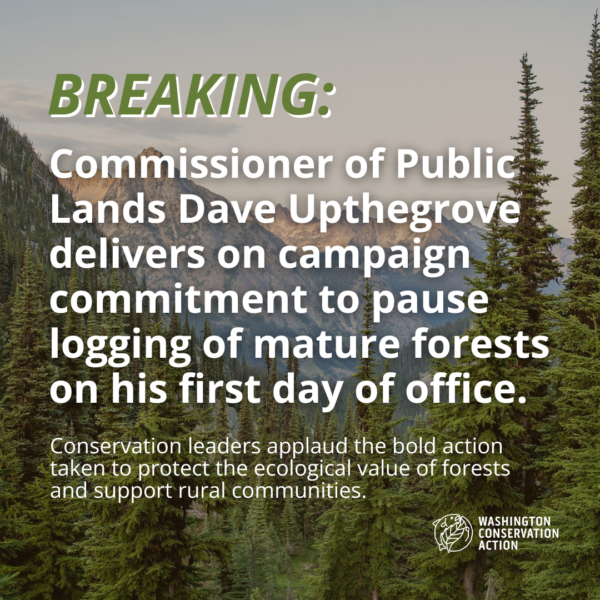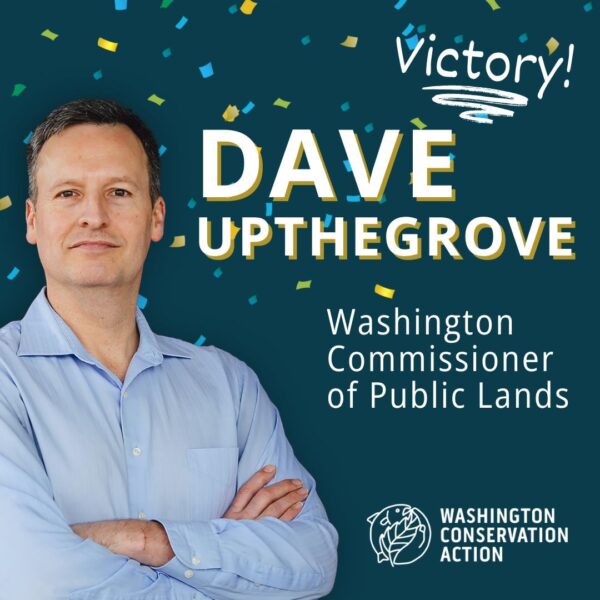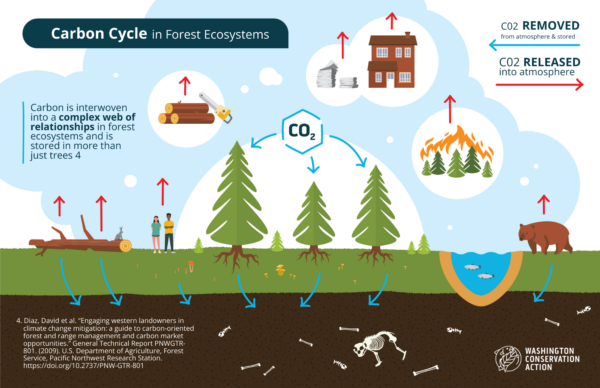
In January 2020, Washington Environmental Council along with Conservation Northwest, Olympic Forest Coalition, and local individuals, filed suit asking the courts to interpret the terms of the Washington State Constitution directing that public state-managed forestlands are “held in trust for all the people.”
Our organizations are urging the Court to hold that the Washington State Constitution explicitly authorizes and requires the Department of Natural Resources and Commissioner of Public Lands to manage these lands in the long-term best interests of all Washingtonians, and not exclusively to maximize revenue for a narrow group of trust beneficiaries.
For decades, WEC has been involved in forestry issues on state-managed trust lands, and our goal is to ensure these working forests are ecologically healthy and productive for many generations to come.
This case does not seek to discontinue logging on state trust lands, or challenge that named trust beneficiaries (such as the state school construction account, timber counties, and public universities) should receive the revenue from timber sales on trust lands. Simply put, WEC believes that our state’s forests provide innumerable services to the beneficiaries and all Washingtonians, and decisions about forest management on public state forestlands should not prioritize revenue above all other forest benefits. Clarity on the law is particularly important now, asthe climate crisis threatens the health and longevity of all the services these forests provide, including clean air, clean water, carbon sequestration, flooding and landslide prevention, and timber revenue. We view the language “for all the people” in the state constitution to support this broader view of trust land management.
This interpretation of the constitution would give the Department of Natural Resources and Commissioner of Public Lands flexibility to holistically take into consideration all of these values, and more, when making management decisions. WEC believes this added flexibility could and should also support management practices that intentionally increase jobs and economically benefit rural communities.
Beneficiaries that receive revenue from state-managed forests and residents across the state should not be forced to choose between cutting down trees for funding and keeping healthy forests standing to protect local air, water, habitat, and public health. These are not mutually exclusive goals, but the current system continuously puts them at odds.
All these very real needs must be fulfilled.
Washington Environmental Council is ready to help develop a new model and policies for sustainable management of state forest lands that prioritize multiple values, including solutions that support ecologically-based forestry, and community socioeconomic health and resilience.
In an exciting development, the Washington State Supreme Court has accepted the case for review, bringing us a step closer to clarity on the parameters for the state’s forestland management. A full press release from the organizations on the supreme court’s acceptance of the case is below.
Press Release:
Conservation Northwest, Washington Environmental Council and Olympic Forest Coalition are pleased that on March 3, 2021 the Washington Supreme Court granted direct review in Conservation NW, et al. v. Commissioner of Public Lands et al., No.; 99183-9. This historic case asks the Court to interpret the plain terms of the Washington State Constitution providing that “all the public lands granted to the state are held in trust for all the people”.
The organizations are urging the Court to hold that the plain terms “for all the people” and Washington’s unique federal land grant history authorize and require the State and Commissioner of Public Lands to manage these three million acres of state public lands for the greatest value for all Washingtonians, including both revenue from timber and values derived from our forests such as clean water, tribal treaty rights, outdoor recreation, fire resiliency, carbon sequestration to mitigate climate change, habitat for threatened and endangered species, and other public benefits.
At the same time as advancing this historic appeal, the organizations are also genuinely committed to working with the specific economic beneficiaries to ensure any reforms in how Washington’s state forests are managed will be sustainable, equitable, and fair to the communities who have been historically-dependent on the state forests.
“Today we move a big step closer to clear legal determination of whether Washington’s state public lands may be managed in the best interests of all the people,” said Mitch Friedman, Executive Director of Conservation Northwest. “These lands are a gift that should not have to be squeezed for every dollar when they already benefit us in so many ways, from storing carbon to providing clean water, wildlife habitat and healthy recreation access,” said Friedman. “After over twenty years of believing the law says one thing while watching our resources sacrificed under a strained and biased interpretation, I can’t wait for the State Supreme Court to speak on the matter.”
“We are beginning to see unprecedented changes in our state forests, habitats, and watersheds from the climate crisis,” said Connie Gallant, President of the Olympic Forest Coalition. “The revenues for school construction and essential services are important now more than ever because of pandemic deficits. We can no longer afford to sacrifice our forests for short term revenues. We have to balance the interests of all the people with the ecological and economic imperatives we face. This case will hopefully resolve the legal issues and that will leave us a clear path to resolve the policy differences, balance our interests and find a path forward.”
“Washington’s forests are among our state’s greatest assets, providing innumerable cultural, economic, and environmental benefits, said Lisa Remlinger, Chief Policy Officer, Washington Environmental Council. “The Washington State Supreme Court’s decision to grant direct review of this case brings us closer to recognizing the full value and potential of our public lands—an especially important ambition at a time when our climate and communities are in crisis. We stand ready to help develop solutions for management of our public lands that meet the challenges of today, and can weather the inevitable changes to Washington’s climate, population, and economy. By truly managing state lands to benefit all the people, we have an opportunity to support both resilience and economic well-being for rural communities, and a healthy environment for all Washingtonians for generations to come.”
###
“Keeping the Northwest wild” since 1989, Conservation Northwest is a regional non-profit organization that protects, connects and restores wildlands and wildlife from the Washington Coast to the British Columbia Rockies. Staff operate in local communities and rural areas around Washington and into southern B.C., using dialogue to find common ground and collaborative solutions for challenging issues including habitat corridors, wilderness conservation, forest restoration and endangered species recovery.
The Olympic Forest Coalition (OFCO) promotes the protection, conservation and restoration of natural forest ecosystems and their processes on the Olympic Peninsula. This mission includes monitoring and caring for the public forests, watersheds and bays of the Peninsula. OFCO’s approach integrates science-based solutions that protect and restore natural ecosystems, threatened and endangered species, and healthy rural communities. OFCO incorporates the climate crisis and mitigating its impacts on the Olympic Peninsula as foundational for all of its work.
Washington Environmental Council is a nonprofit, statewide advocacy organization that has been driving positive change to solve Washington’s most critical environmental challenges since 1967. Our mission is to protect, restore, and sustain Washington’s environment for all.
More information is available in this January 2020 statement



